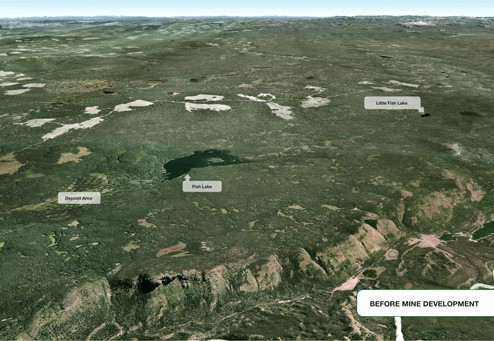VANCOUVER — There haven’t been many modern permitting processes in Canada that have cast as large a shadow as the federal government’s recent rejection on environmental grounds of Taseko Mines’ (TSX: TKO; NYSE-MKT: TGB) proposed New Prosperity open-pit, copper–gold mine in south-central B.C.
Taseko has been trying to develop New Prosperity for the past four years, but hit a permitting wall with respect to nearby Fish Lake and the long-term health of the region’s dominant water system.
And the battle lines were clearly drawn. On one side sat some local communities in dire need of regional employment. New Prosperity lies 125 km southwest of Williams Lake in an area that has seen its lumber-based economy ravaged by the mountain pine beetle over the past decade.
Local mayors and business leaders rallied around Taseko, and in late 2013, the B.C. Liberal government and Minister of Energy and Mines Bill Bennett firmly supported the project. New Prosperity also fit into the provincial government’s Jobs Plan, which targets eight new mines by 2015.
“There were a lot of people in the region who really, really wanted this to happen. Right now in the Cariboo, it’s as likely as not that your dad is going to Fort McMurray for work. That’s the unfortunate nature of the regional economy,” Bennett said during an interview at the annual Prospectors & Developers Association of Canada (PDAC) convention in Toronto.
Standing against New Prosperity’s development was Chief Joe Alphonse and the Tsilhqot’in First Nation, which opposed the project on environmental grounds, citing their Aboriginal rights and title.
In some quarters, there remains skepticism about the federal panel’s report and Environment Minister Leona Aglukkaq’s decision to nix New Prosperity. Taseko says it will pursue a federal judicial review on the project.
“I’m eager to see how the court case evolves in terms of whether the procedure followed by the federal panel was in fact fair,” Bennett continued. “I am stymied as to why the panel came to the conclusion that you can’t build this mine without contaminating Fish Lake. There are examples of these types of projects mitigating similar environmental concerns all over the province. There is nothing environmentally unique about the location of [New Prosperity].”
On March 3 Prime Minister Stephen Harper took the stage at the PDAC conference, and responded to questions surrounding his government’s decision to reject the project. He is the first sitting Canadian prime minister to have attended the event.
Harper labelled the environmental report “extremely negative,” especially in terms of “hydrographic systems” in the region. Despite the federal government unilaterally calling New Prosperity an “environmental issue,” Harper also seemed to indicate that the Tsilhqot’in played a role.
“I’ll be frank: it is also in an area with unresolved land-claim issues with local Aboriginal groups. Considering all the environmental and legal advice the government received, we did not have the grounds to approve the project,” Harper said.
Bennett seemed surprised by Harper’s comments. He said during his time in Ottawa over the past few months ministers and staff involved in the review had explained to him that it was purely an “environmental process.” Bennett said he had provided a signed letter outlining why the provincial government felt the project was environmentally sound under B.C. guidelines.
“If I’m in the federal cabinet and my review process comes back and indicates you can’t build the mine without high risk of negative environmental impact, then it is a problematic place to be,” Bennett added. “They were basically boxed in, and I went to Ottawa and tried to help. We don’t allow mines to be built in our province if the project is going to contaminate a nearby lake.”
Meanwhile, Harper extolled the virtues of his government’s “one project, one review” concept, and pointed out that since 2006, 26 of 32 projects submitted to environmental scrutiny under the system have been green-lighted.
“It won’t mean that every project gets approved . . . but it does mean that every project undergoes rigorous evaluation, and there will be certainty regarding the process and timelines,” Harper added. “[The New Prosperity report] said very clearly that the project, as previously and currently conceived, would not address the long-term destruction of that water system. Our experts said they could see no proposed, plausible mediation for that.”


Be the first to comment on "PM Harper, BC’s Bennett on rejection of Taseko’s New Prosperity"